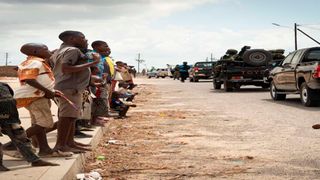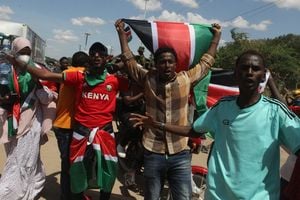
Residents of Cabo Delgado look on as a patrol of Rwandan soldiers drives by in Quitunda Camp in Afungi, Cabo Delgado, on September 22, 2021.
| AFPSADC sticks to military solution in Mozambique's Cabo Delgado
Buoyed by the considerable success of the six-month intervention against Islamic insurgents in northern Mozambique, southern African leaders are now determined to push a military solution, instead of dialogue, to one of the biggest security threats in the region.
Southern African Development Community (SADC) leaders met for two days in Malawi this week, agreeing to extend the mandate of the Standby Force Mission to Mozambique (SAMIM) by another three months as they celebrated gains against Islamic State insurgents in the Cabo Delgado region.
Six months ago, SADC member states and Rwanda sent more than 3,000 troops to Mozambique as the insurgents threatened to overrun the region that is rich in oil and gas.
South African President Cyril Ramaphosa, who chairs SADC's defence and security troika, hailed the "significant progress” in tackling the jihadist insurgency.
"Since the deployment, significant progress has been made," President Ramaphosa told the two-day summit attended by leaders from Malawi, Tanzania, Namibia, Mozambique, Zambia and Zimbabwe in Lilongwe.
"The security situation in Cabo Delgado is improving, which has allowed for some internally displaced persons to return to their homes and resume their normal lives," he added.
President Ramaphosa said operating alongside Mozambican troops, SADC forces have helped to create "safe passage" for humanitarian workers to bring aid into jihadist-hit areas.
His Malawian counterpart Lazarus Chakwera, who is the SADC chairperson, said the region was now looking at consolidating the gains they made in Cabo Delgado by pushing the insurgents out of Mozambique.
"A particular note is that today we have taken a bold and decisive step to extend the mission in Mozambique so that we are able to consolidate and sustain the gains we have made thus far," President Chakwera said.
Terrorism
"Until victory and peace is secured, we will not relent, we will not regress and we will not retreat."
The leaders approved "the Framework for Support to the Republic of Mozambique in addressing terrorism which outlines, among others, actions for consolidating peace, security and socio-economic recovery of the Cabo Delgado Province," said a comminique released after the summit.
They also endorsed the convening of an "International Conference to support the economic and social reconstruction of Cabo Delgado Province, and called upon the international cooperating partners to support the initiative."
But Sherrif Kaisi, a security expert from Malawi, insisted that dialogue was the only viable solution to the conflict in northern Mozambique that has claimed the lives of tens of thousands of people.
Mr Kaisi said it was going to be difficult to completely rid the region of the extremists as they could easily melt into the local communities as they were not an organised military force.
"So the heads of state should not only stick to their guns, combating the insurgency through arms, but other avenues like sitting down (with them)," he told VOA.
"Even rebels are human beings. If you dehumanise them, the war would continue and many people would lose their lives."
Religious leaders in Mozambique have been pushing for interfaith dialogue to help end the conflict.
Christian and Muslim leaders, who met in Pemba earlier this month, promised to push for a peaceful resolution to the Cabo Delgado fighting.
"We declare our unity and our unanimous rejection of terrorist and extremist acts and reaffirm our commitment to stand side by side for peace and brotherhood so that society does not see it as the cause of conflicts," they said in a statement.
"This is particularly true in the Islamic religion, which is most affected by prejudice".
3,000 civilians killed
Almost one million people have been displaced and more than 3,000 civilians killed since the insurgency began in 2017.
The insurgents have been accused of massacres, beheadings, torching of homes and mass abductions.
Cabo Delgado is a gas-rich province bordering Tanzania and has been gripped by violence since the conflict began nearly four years ago.
Rwandan troops were the first to arrive in the region in June last year and SADC troops were deployed the following month.
SADC members Botswana, South Africa, Lesotho and Tanzania are some of the countries that contributed boots on the ground while Zimbabwe and Angola have deployed military trainers to assist the Mozambican army.
Mozambique's neighbours are also providing humanitarian assistance to people displaced by the conflict in Cabo Delgado.
Southern African countries were pushed to intervene by fears that the insurgency would spread to their territories if left unchecked.
Mozambique has also been fighting armed bandits in the central parts of the country.





